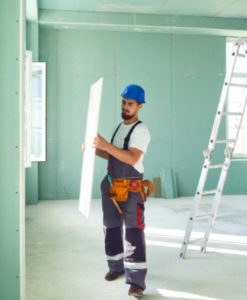
Drywall
11 month Program
Drywall applicators often install walls and ceilings, as well as place insulation, soundproofing, and firefighting materials behind and over those walls and ceilings. They can also apply textures and ornaments to enhance both the interiors and exteriors of buildings.
Program’s Curriculum
Basic Safety (12.5 Hours)
Presents basic jobsite safety information to prepare workers for the construction environment. Describes the common causes of workplace incidents and accidents and how to avoid them. Introduces common PPE, including equipment required for work at height, and its proper use. Information related to safety in several specific environments, including welding areas and confined spaces, is also provided.
Introduction to Construction Math (10 Hours)
Reviews basic math skills related to the construction trades and demonstrates how they apply to the trades. Covers multiple systems of measurement, decimals, fractions, and basic geometry.
Introduction to Hand Tools (10 Hours)
Introduces common hand tools used in a variety of construction crafts. Identifies tools and how to safely use them. Proper hand tool maintenance is also presented.
Introduction to Power Tools (10 Hours)
Identifies and describes the operation of many power tools common in the construction environment. Provides instruction on proper use, as well as on safe-handling guidelines and basic maintenance.
Introduction to Construction Drawings (10 Hours)
Introduces the basic elements of construction drawings. The common components of drawings are presented, as well as the most common drawing types. The use of drawing scales and how to measure drawings is also covered.
Introduction to Basic Rigging (7.5 Elective Hours)
Provides basic information related to rigging and rigging hardware, such as slings, rigging hitches, and hoists. Emphasizes safe working habits in the vicinity of rigging operations.
Basic Communication Skills (7.5 Hours)
Provides good techniques for effective communication on the job. Includes examples that emphasize the importance of both written and verbal communication skills. Describes the importance of reading skills in the construction industry and covers proper techniques to use in a variety of different written communication formats.
Basic Employability Skills (7.5 Hours)
Describes the opportunities offered by the construction trades. Discusses critical thinking and essential problem-solving skills for the construction industry. Also identifies and discusses positive social skills and their value in the workplace.
Introduction to Material Handling (5 Hours)
Describes the hazards associated with handling materials and provides techniques to avoid both injury and property damage. Common material-handling equipment is also introduced.
Orientation to the Trade (5 Hours)
Reviews the history of the trade, shows examples of the work involved, describes the apprentice program, identifies career opportunities for construction workers, and lists the responsibilities and characteristics a worker should possess.
Construction Materials and Methods (12 Hours)
Gives the trainees an overview of the materials and techniques used in building and finishing residential and commercial buildings, including wood- and steel-framed structures, masonry construction, and concrete-formed structures.
Thermal and Moisture Protection (7.5 Hours)
Covers the selection and installation of various types of insulating materials in walls, floors, and attics. Also covers the uses and installation practices for vapor barriers and waterproofing materials.
Drywall Installation (25 Hours)
Describes the various types of gypsum drywall, their uses, and the fastening devices and methods used to install them. Contains detailed instructions for installing drywall on walls and ceilings using nails, drywall screws, and adhesives. Also covers fire- and sound-rated walls.
Drywall Finishing (25 Hours)
Covers the materials, tools, and methods used to finish and patch gypsum drywall. Includes coverage of both automatic and manual taping tools.
Commercial Drawings (25 Hours)
Builds upon the information presented in the Introduction to Blueprints module in Core Curriculum. Covers the techniques for reading and using architectural and structural drawings and specifications.
Steel Framing (50 Hours)
Describes the types and grades of steel framing and provides instructions for selecting and installing steel framing for interior walls, exterior nonbearing walls, and partitions. Includes coverage of engineered framing systems.
Acoustical Ceilings (20 Hours)
Covers the materials, layout, and installation procedures for many types of suspended ceilings used in commercial construction, as well as ceiling tiles, drywall suspension systems, and pan-type ceilings.
Interior Specialties (15 Hours)
Covers the composition and use of various specialty interior finishing products, such as vinyl- and fabric-covered panels, wood wall and ceiling panels, and glass fiber-reinforced gypsum (GFRG) panels.
Exterior Cladding (20 hours)
Covers a variety of specialized exterior finish products, including EIFS, stucco, synthetic veneer stone, panelized cladding, and glass fiber-reinforced concrete (GFRC) panels.
Specialty Finishes (15 Hours)
Covers the materials, tools, and application methods used for specialized interior finishes, such as sand, marble, clay, and Venetian plaster.
